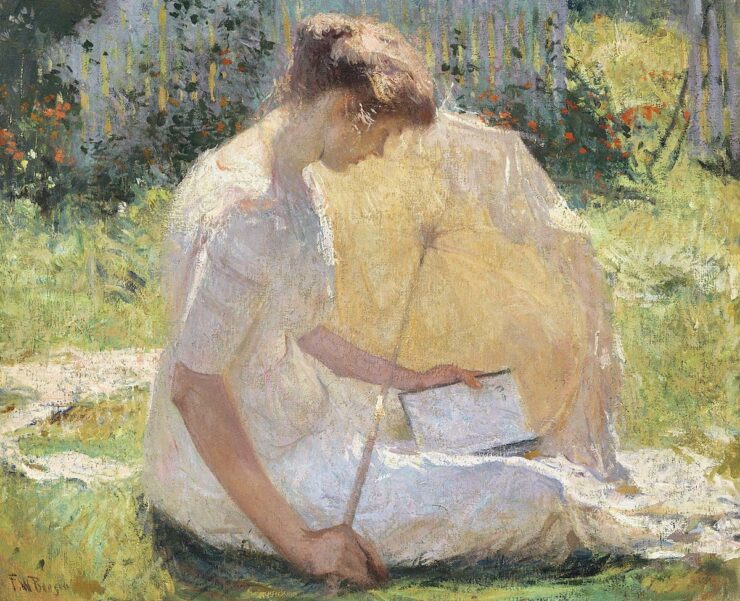Saying “The vibes are off” no longer cuts it, if it ever really did. Twitter is broken/has been broken/was broken/perhaps has always been broken, but more people than before seem to be draped in mourning black, dropping last flowers on their way out the door. I would like to be one of them—I am one of them, in my heart—but bad habits, as it turns out, are often easier made than broken.
This is not a post about Twitter (I’m not calling it the other thing. Also, if you want to read a post about Twitter, John Scalzi did a good one already). Twitter is not the internet, the internet is not Twitter; there are other places to go, other ways to interact, though none of them have yet risen to the sense of being required. It’s a post about readers, and the internet, and what we want from all of it. What are we doing here? What do we wish we were doing here? What would the bookish internet look like if we could recreate it in some ideal form?
But we do have to talk about Twitter a little bit. The collapse of this flawed platform means a lot of things to a lot of people, among them authors and other writers who’ve used it to connect with readers, fans, and admirers (and yes, haters and trolls), who are now left in a world where they’re expected to be their own marketing teams—but can no longer rely on the platform they once had. SFF magazines worry about how they will reach readers, how they will fundraise, and what will replace Twitter.
Writers, magazines, readers, other creators all existed before Twitter and will exist again, but to make an extremely obvious statement: The world is different now. Everyone who wants to share their work is competing with a million zillion things—not just other books, other writers, but everything else that’s grabbing for our attention, from memes to dance routines to weird stuff on YouTube to funny cat videos to [insert any internet timesuck here]. Even if you just look at books, any reader who wants to find their next great read is paddling in an overwhelming sea of options, with fewer and fewer resources to help them make informed choices. Papers shrink, magazines shrink, and arts coverage gets cut first. Without reliable income, critics and writers have to earn money somehow; their best work (understandably!) goes into paywalled newsletters.
And then there are the related problems with all of these things: Twitter shouldn’t be necessary. Authors shouldn’t have to worry about personally pushing their preorders, or getting enough clicks, or having enough followers. Publishing should take better care of the books it buys. Publishing employees should have far fewer books to worry about each week or month or season. Journalism shouldn’t be dependent on clicks or ad sales. Writing about the arts should matter, but the world doesn’t work like that now, if it ever did.
Sometimes, it feels like the internet—the world—has always been this way. Like we have always been looking for the biggest sandbox to play in, never mind that the bigger the sandbox, the more likely it is to have some cat turds in it. Even if you are not trying to build an audience, you might be trying to find your people, your bookish online pals with whom to have conversations, arguments, loving competition—and they might all be on Friendster or Myspace or Facebook or Tumblr or LiveJournal or Twitter.
And then those spaces might fall.
There’s so much I don’t want to rehash about the various phases of the social internet. But I do want to say: It has not always been like this and it does not always have to be like this. Remember the heyday of blogs? Blogs did not all live in the same place. Many were on Blogger, or LiveJournal, or various other sites now crashed and burned, but there was not just One Blog Place. You could read them from everywhere via Google Reader, or another RSS feed. (The sheer number of times I have already wanted to type “RIP” after a proper noun is depressing.) You could get invested in threaded comment discussions. You could chase one blog to the next, following recommendations that were often along similar subject lines: personal blogs, music blogs, movie blogs, mommy blogs, car blogs, Buffy blogs, you name it. They’re still out there, some of them. But do we even have the attention span to appreciate them?
It feels downright ridiculous to wish for this now, like wishing we could go back to horse-drawn carriages. But those blogs did not feel corporate, consolidated, smashed together into one format that suits everyone and no one. They were quirky and weird and required effort both to maintain and to find in the first place.
I also don’t want to mythologize how things used to be harder—the “kids these days” refrain of how we used to have to go search the dusty shelves of hard-to-find bookstores for anything to read. (It’s still hard to find what we want! Just hard in a different way.) What I do mythologize, in the old-man-yells-at-cloud corners of my brain, is the way that we used to sustain a different kind of effort in our online connecting. There are so many SFF writers and editors I read whose LiveJournals or blogs I read before I ever read their books—or before they were published. I miss forums, I miss listservs, I miss conversations that required considered thought and taking the time to make an argument or a point; I miss, even, the feeling of being too intimidated to post in these places until I had read them for a long, long time, had internalized their rhythms and the ways people were with each other; until I understood how to make my own case without just throwing out my first thoughts and hoping someone might run with them. (I am thinking, in part, of the terrifyingly erudite Barbelith, a forum for fans of the work of Grant Morrison.)
What I want is a bookish internet that feels like that. But how do you have that without people giving up so much of their time? How do you have that in a post-everything-is-monetized internet? How do you have that in an internet that in some corners has fully pivoted to video? How do you have that when we have been so thoroughly trained to try to be funny in less than 280 characters?
Goodreads is incredibly broken, and I don’t know that any site built on star reviews can ever truly be a place for community. Twitter is a hot mess. Bluesky is invite-only and taking its sweet time and not without major flaws. So many other would-be replacements have already crashed and burned. Storygraph seems cool but what I want is not a list function or a tracking function. What I want is an ongoing, massive, sprawling conversation.
That can’t happen just in newsletters, though there are so many good ones. That can’t happen just in the comments here, though I remain grateful and glad that this site has a robust and well-moderated comments section. Can it happen in various Discords? I belong to at least three run by/for authors, but even I forget to check them often enough.
What would a real bookish forum look like? Could an individual creator inspire something wide-ranging and immersive, like some of the early-2000s comics forums? Is it simply too much work to keep out the people who just want to tear things down?
Where do you go when you want bookish community? Where do you want to go? What does a better bookish internet look like? What kinds of things does it have and run on? It can’t just be one thing, one site, one platform. It needs more legs to stand on, and more ways to catch itself when a pillar crumbles.
It would almost be easier to throw up my hands, to concede, to think that maybe I’ve spent enough years online seeking community and bookish conversations and new things to read and new ways to talk about them. To tell myself to just get offline and read books, alone, sitting on the deck, staring into space when something sends me down a rabbit-hole of unrelated ideas.
I don’t want to, though. I want to figure out what we’re missing, and if it can be found.














